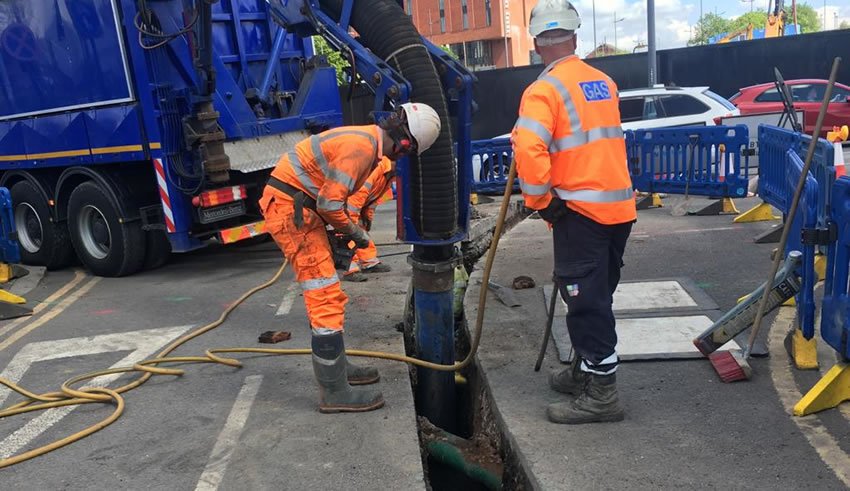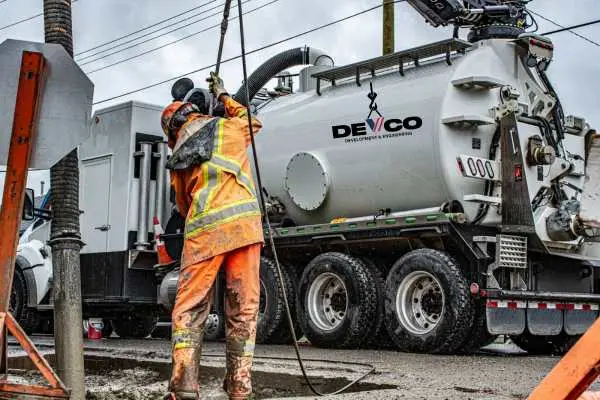Estimated reading time: 6 minutes
Last updated on August 21st, 2025 at 09:45 am
Are you planning a residential construction project that involves digging? Have you considered using hydro excavation instead of traditional excavation methods? Hydro excavation, also known as vacuum excavation, is a safer and more efficient way to excavate soil and debris.
In this article, we will discuss when you need hydro excavation in residential projects and the benefits of using it.
Hydro Exca-what Now?
Hydro excavation is a process that involves using pressurised water to break up soil and debris, which is then vacuumed up into a holding tank for disposal. This method is much safer than traditional excavation methods, as it reduces the risk of damaging underground utilities, such as water and gas lines, and other buried objects. Hydro excavation can be used for a wide range of applications, from potholing and trenching to cleaning catch basins and removing debris from hard-to-reach areas.
The Savvy Homeowner’s Secret Weapon for Safe Digging

Hydro excavation is not just an excellent option, it’s becoming the preferred method for residential construction projects that require excavation. With traditional excavation methods, the digging process can be quite dangerous and can damage existing underground utilities, pipes, or cables. With hydro excavation, the use of high-pressure water and a vacuum ensures that the excavation is done safely and accurately.
This method is ideal for digging in areas with limited access or where traditional excavation methods may not be practical. This includes narrow spaces, areas with limited overhead clearance, or locations with challenging terrain.
Unlike traditional excavation methods that require heavy machinery and excavation equipment, hydro excavation utilises a small, manoeuvrable truck that can access tight spaces and difficult areas. This minimises the disruption to the surrounding area and reduces the risk of damage to existing structures or landscaping.
Another benefit of hydro excavation is its ability to excavate around sensitive areas, such as trees or landscaping, with minimal damage. Traditional excavation methods can damage the roots of trees or other plants, leading to their death.
Hydro excavation, on the other hand, uses a non-destructive digging process that carefully removes the soil around sensitive areas, leaving them intact and unharmed. This is particularly important for homeowners who have invested time and money into their landscaping and want to preserve it during the excavation process.
It’s also an effective way to excavate in areas with poor soil conditions, such as clay or sand. These types of soil can be difficult to excavate with traditional methods, as they tend to stick to excavation equipment and can cause clogs or other problems.
Hydro excavation utilises high-pressure water to loosen the soil and a vacuum to remove the soil, making it an effective solution for excavating in these types of soil conditions.
Dive Deep into Hydro Excavation

Several common residential projects may require hydro excavation, including:
Installing Underground Utilities
Hydro excavation is an ideal way to excavate for building foundations as it allows for precise digging and minimises the risk of damage to existing utilities. This non-destructive digging method ensures that the same underground utilities you’re trying to avoid, such as gas lines or water pipes, are not damaged during the excavation process.
Repairing Sewer Lines
It’s an effective way to excavate around damaged sewer lines without causing further damage.
When it uses high-pressure water to break up the soil around the damaged sewer line, it leaves a clean and precise excavation site. This precise digging technique ensures that the damaged sewer line is not further compromised during the excavation process.
Landscaping and Tree Planting
Hydro excavation uses high-pressure water to break up the soil around the tree or plant, while a vacuum system removes the soil, creating a clean and precise excavation site. This non-destructive digging technique ensures that the tree or plant is not further compromised during the excavation process and that the surrounding soil remains intact and healthy. This comes even more useful when planting trees or installing irrigation systems.
Swimming Pool Installation
Hydro excavation is an effective way to excavate for swimming pool installation, as it allows for accurate digging without damaging existing utilities or landscaping.
Building a Foundation
Hydro excavation is an ideal way to excavate for building foundations, as it allows for precise digging and minimises the risk of damage to existing utilities.
Shallow Digging for Concrete
It’s also useful even for shallow digging compared to previous examples. For example, if you are planning to install exposed aggregate concrete, hydro excavation can be a great solution to excavate the area where the concrete will be poured. Exposed aggregate concrete is a popular choice for residential projects as it provides a decorative and textured finish.
A Clear Winner in Washing Away Your Worries
There are several benefits to using hydro excavation in residential projects, including:
Safety
Hydro excavation is a safer alternative to traditional excavation methods, as it minimises the risk of damage to underground utilities and other buried objects. It also reduces the risk of injuries to workers, as it eliminates the need for manual digging.
Accuracy
Hydro excavation allows for precise digging, which is necessary for many residential construction projects. It also allows for excavation in hard-to-reach areas, which may not be accessible with traditional excavation methods.
Time and Cost-Effective
Hydro excavation is a time and cost-effective alternative to traditional excavation methods. It requires less labour and equipment, which can result in lower costs for the project.
Non-Destructive
Hydro excavation is a non-destructive method of excavation, which means that it minimises the risk of damage to existing utilities and other buried objects. This is important for many residential construction projects, as it reduces the need for additional repairs and costs.
Conclusion
Hydro excavation is an excellent option for residential construction projects that require excavation. It is a safer and more efficient alternative to traditional excavation methods, and it can be used for a wide range of applications.
If you are planning a residential construction project that involves excavation, consider using hydro excavation instead of traditional methods. This will not only ensure the safety of workers and existing utilities, but it will also save time and money in the long run.



